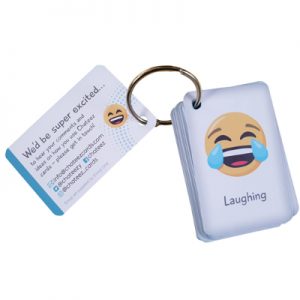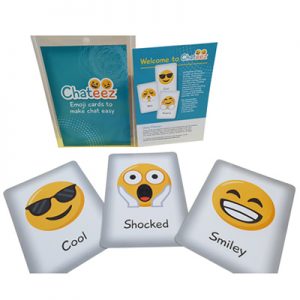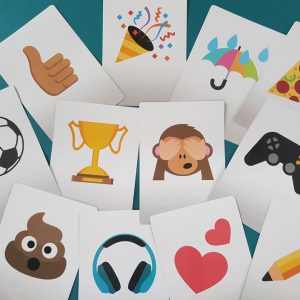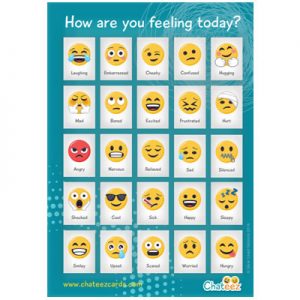
Success stories
Chateez cards are being successfully used by children and youth service professionals and families across the world.
- Parents
- Teachers
- Foster Carer and Adopted Parents
- Children’s Social Workers
- Child Psychologists
- Counsellors
- Youth Workers
- Local Authorities
- Children’s Services
- Child Bereavement charities
- Women’s Aid and Refuge Charities
- Mental Health Charities
- Sports Charities
- Children’s Hospitals
- Youth Forums
- Market Research
Read what people have to say!
“I’ve been amazed at how something so simple can make such a big difference during sensitive conversations. With Chateez cards, the barriers of age, language, culture and ability are broken down and children and young people can easily find a card to represent how they feel.” Dr Pooky Knightsmith, Director, of Children, Young People & Schools Programme – Charlie Waller Memorial Trust
“In the last year, we have used Chateez cards within several of our projects, including the Special Olympics European research project SEDY (Sport Empowers Disabled Youth). We have also used them within inclusive focus groups within our Play Unified programme; in order to capture how young people with additional support needs feel about the project ,and allow them to express themselves in a more comfortable way. The cards have been invaluable to the evaluation of the project and have allowed us to capture amazing insight into how young people feel”. Rachael Batters, Project Ability Officer – Youth Sports Trust
“I use my Chateez in a variety of settings to encourage children and adolescents to say the unsayable or put into words what their vocabulary cannot yet express eg very young children, youngsters with intellectual impairment or trauma and abuse. People dread speaking to a psychiatrist, so it takes some of the awkwardness out of the situation to turn up with these fun little emoji cards. Even professionally bored adolescents sit up and take notice!” Dr Erika Harris, Consultant Child and Adolescent Psychiatrist
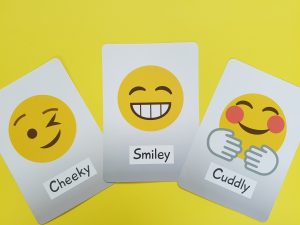
“Everyone we’ve shown them to loves them, and children just get it. They are such a familiar concept and can be used in so many ways to enhance communication. Brilliant idea!” Anne Ross, Behavioural Psychologist – ADD-vance
“We used the Chateez cards in our Mental Health Awareness training session for young mothers. They encouraged mums to express themselves and enabled us to better understand the state of mind of the trainees before beginning a session. We bought a pack for each of us to use again and again — a very useful product.” Katrina Jenkins, Project Lead” — The Mental Health Foundation
“Chateez work exceptionally well in 1:1 ELSA sessions at our primary school. Most children are more familiar with Emoji’s and are able to recognize and understand the various emotions. I am stopped many a time in the lunch hall with children wanting to look at them ; this creates a great conversation with individuals or groups, where we are discussing emotions whilst eating their lunch! Chateez get the big thumbs up from Barrow Hedges Primary School!” Jo Cloves, ELSA Teacher, Barrow Hedges Primary School
“I used SLH’s Chateez cards with a child in foster care, aged 11, to find out how he felt about various issues, including a recent move to new carers. They were really useful in helping us talk about each emotion that he chose, and discuss how you can have various and opposing feelings about one situation at the same time.” Charlie Sackey, Senior Placement Support Worker — Wandsworth Children’s Services
“A big hit with various teachers, psychologists and speech and language therapists who work with pupils with social communication disorders and learning disabilities. There’s a great choice of cards, so are suitable for those with more significant needs, and those who need help in interpreting the more subtle feelings and emotions. They are of a very high quality and will last a long time.” Jill Davies, Programme Manager – Foundation for People with Learning Disabilities
“These have supported interaction with children from four to 16 years old for the purpose of safeguarding assessments. I have used them now on 18 different occasions and six times the child has given me the ‘silenced’ card. This is significant and evidences that non-verbal communication can provide information that may not be so readily captured through conversation.” Dr Laara Jupp, Clinical Psychologist – L J Psychology Practice
“Kids used these Chateez cards without hesitation! ‘Silenced’ because I feel too nervous to speak. ‘Sad’ because I left my old school. ‘Worried’ because I might lose more friends. ‘Excited’ about the new trips. ‘Nervous’ that the work will be really hard.” Nikki Hart, Year 3 Teacher – St Michaels Primary School
“I used the Chateez cards with a young person aged 14 years old who I have over a period of time, tried various different tools and methods to get her to open up about her feelings. On my first occasion of using the Chateez cards, she was so engaged and was able to express her feelings with ease. The young person commented at the end of the session that she found the cards not only fun to use, but also a great way to express herself. Following our sessions we shared the information gathered with the foster carer who was amazed to hear for the first time, some of the things that the young person was feeling. I feel that the Chateez cards are a great asset to any social worker’s ‘tool box’ and would highly recommend their use – not only with young people, but I would also consider using them with foster carers”. Sharon Gordon, Senior Social Worker — Wandsworth Children’s Services
“Youngsters today relate to emojis so they are powerful because they are the emotions the young people understand. They are in everyday life, and because of that, they understand and recognise what they are”. Gill Whitlock, Post 16 Lead – Milestone Academy
“I used the key chain cards at my job in a after school childcare program and the larger cards with the dry erase marker in a art class for traumatized children at a domestic violence center. I always have a question of the day and one of the two parts of that includes presenting how they feel with two or three cards, if they feel comfortable. They love using the cards, and it’s a win-win as I get to know what kind of day they’re having and they feel that there voice and experiences matter.” Brenda Fowler, Domestic violence centre
Our success stories
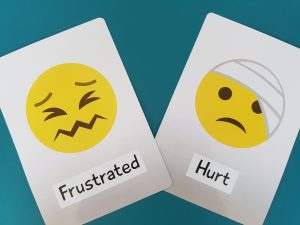 From the six-year-old adopted boy who underwent major heart surgery, who used the cards to tell the doctors how he was feeling about his operation, to the group of 15- and 16-year-olds who used the cards to talk about what the future holds for them, Chateez is having a real impact. Here are a few real stories of how Chateez has changed young people’s lives for the better… Read more
From the six-year-old adopted boy who underwent major heart surgery, who used the cards to tell the doctors how he was feeling about his operation, to the group of 15- and 16-year-olds who used the cards to talk about what the future holds for them, Chateez is having a real impact. Here are a few real stories of how Chateez has changed young people’s lives for the better… Read more
And Most Importantly …What Young People Are Saying
“They’re really funny, I want to draw one, too. I’m going to draw how Mummy feels.” (7 years old)
“Can I take them home? I can give them to my mum because she’s always nagging me about talking when I don’t want to.” (10 years old)
“They’re cool! Usually I get asked to look at stupid cards for kids, these are different. I like it that young people made them… that’s why they are cool.” (16 years old)
“I like them. It’s easier to pick cards out and then talk about them, otherwise I worry about what I’m going to talk about and don’t know what to say when they ask me lots of questions.” (13 years old)
Check out our  cards today!
cards today!

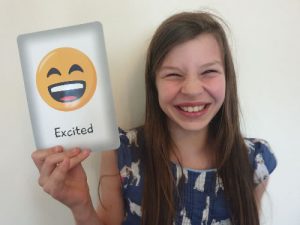
 cards today!
cards today!